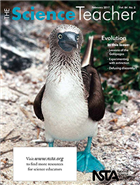Career of the Month: Evolutionary Psychologist
By sstuckey
Posted on 2017-02-24
Evolutionary psychologists analyze human behavior for traits that evolved to increase the odds of survival and reproduction. They may then apply this knowledge to redesign aspects of today’s cultural institutions and practices—such as schools, workplaces, and child rearing—in ways that better align with human nature. Peter Gray is an evolutionary psychologist affiliated with Boston College. His area of focus is education, and he also writes the Freedom to Learn blog on the website of Psychology Today magazine.
Work overview.
As a retired professor, I now mostly research and write about how children educate themselves when they are free to do so. I also examine how education  data fit with evolutionary analysis.
data fit with evolutionary analysis.
A typical researcher may try to figure out which teaching method increases test scores. But when you look at education from an evolutionary perspective, you start to ask more basic questions, such as: What is the purpose of education? One experiment will not answer such questions. Instead, it’s a scholarly approach that synthesizes knowledge from different fields, such as anthropology, history, and even animal behavior.
For example, diagnoses of attention deficit hyperactivity disorder have increased possibly because society no longer tolerates children’s normal unwillingness to sit still for long periods. Instead of adapting school to children, children are being adapted to school. It’s also plausible that depriving children of play is leading to more impulsiveness, because play controls impulsiveness.
Career highlights.
My biggest fulfillment has been writing for the public, first through the blog
and then through my book, Free to Learn. Many people find meaning in my writing, and it has led to speaking invitations and other opportunities.
Career path.
I went to college planning to major in physics. But then I started thinking that the world’s biggest problems are about human behavior, and I wondered how we could bring out the better aspects of people’s being. I became more drawn to psychology and biology. After getting my degrees in psychology and biological sciences, I accepted a job in the psychology department at Boston College.
Many of the introductory textbooks seemed superficial, so I wrote one that covered the usual topics (personality, development, and so on) but from a bio-evolutionary perspective. While I was writing that book, my young son was getting in trouble for questioning his teachers.
We found an alternative school called Sudbury Valley School in Framingham, Massachusetts, where children can follow their own interests. For him, it was a dream come true, but I had my doubts. So I studied the school’s graduates and learned that they went on to do well in college and in a range of careers.
I became intrigued by children’s burning curiosity and desire to play. I began to study education from an evolutionary point of view, wondering what could be learned about children’s natural instincts by knowing about hunter-gatherer cultures.
After surveying anthropologists, I learned that in every hunter-gatherer band studied, children played and explored all day long. It was basically the same philosophy as at Sudbury, where children were free to do what they wanted, to interact with adults who were not judgmental, and to play with children in a mixed-age group. This is how they acquired the skills they needed.
Cultures evolve, sometimes in ways that run counter to human nature. Today’s schools originated at a time when it was believed that children were sinful, and one of the main goals was to break their will and drive out that sin. Humans tend to hang on to cultural things even when they are no longer functional because we are creatures of social norms. Our strong tendency to conform can help us survive in the short term but can be harmful in the long run, unless we create more suitable norms.
Knowledge, skills and training needed.
To be a scholar and researcher is to be curious, to question, and to learn new things. There shouldn’t be any transition between learning and doing.
Advice for students.
Don’t decide what field to go into based only on how you’re doing in your courses. Think about what you like to do in your free time, and that will point you to the career you should pursue.
Bonus Points
Gray’s education: BS in psychology from Columbia College; PhD in biological sciences from Rockefeller University
On the web:
www.psychologytoday.com/blog/freedom-learn;
https://evolution-institute.org; http://bit.ly/Free-to-learn
Related occupations:
biologist, anthropologist, economist
Editor’s Note
This article was originally published in the February 2017 issue of The  Science Teacher journal from the National Science Teachers Association (NSTA).
Science Teacher journal from the National Science Teachers Association (NSTA).
Get Involved With NSTA!
Join NSTA today and receive The Science Teacher,
the peer-reviewed journal just for high school teachers; to write for the journal, see our Author Guidelines, Call for Papers, and annotated sample manuscript; connect on the high school level science teaching list (members can sign up on the list server); or consider joining your peers at future NSTA conferences.
Disclaimer: The views expressed in this blog post are those of the author(s) and do not necessarily reflect the official position of the National Science Teaching Association (NSTA).


